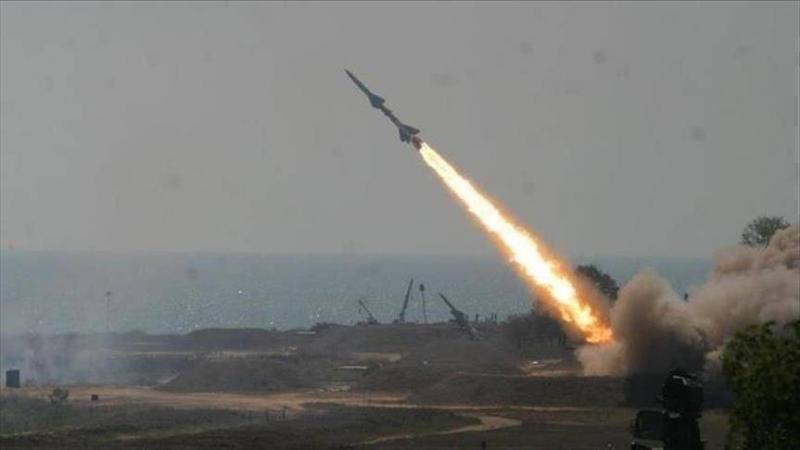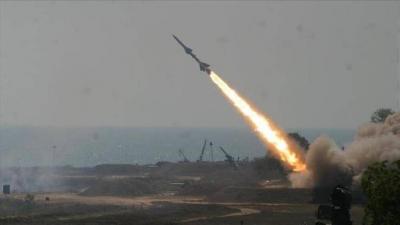The Houthis in Yemen have entered the ongoing war between Israel and Hamas from over a thousand miles away from their stronghold in Sana'a. On Tuesday, they announced that they had launched drones and missiles at Israel in attacks that highlight the regional risks of the conflict. The Houthis, who are part of the "Axis of Resistance" supported by Iran, have backed the Palestinians since Hamas attacked Israel on October 7, opening a new front in a war that has lasted for eight years against a Saudi-led coalition in the Gulf.
Houthi military spokesman Yahya Saree stated in a televised announcement that the group had launched "a large number" of ballistic missiles and drones towards Israel, indicating that more of these attacks would occur in the future to help the Palestinians achieve victory. The military spokesperson's statement confirmed the widening scope of the conflict, raising concerns among several countries, including Saudi Arabia, the world's largest oil exporter, increasing fears of its expansion as Israel seeks to destroy Hamas in its stronghold in Gaza.
Saree noted that this is the third attack by the Houthis on Israel since the beginning of the conflict, seeming to confirm that they executed a drone attack on October 28 that led to explosions in Egypt, for which Israel held the Houthis responsible. Israeli National Security Adviser Tzachi Hanegbi stated that the Houthi attacks cannot be tolerated, but he did not provide details on how Israel might respond when asked about it. The Houthi slogan is "Death to America, Death to Israel, Curse on the Jews, Victory to Islam."
*Axis of Resistance*
The Houthis constitute a significant part of the "Axis of Resistance," which opposes Israel and the United States and conducts attacks throughout the region. Iraqi militias backed by Iran fire on American forces in Iraq and Syria, while Hezbollah exchanges fire with Israeli forces on the Lebanese-Israeli border. The Houthis have demonstrated their capabilities in missiles and drones during the Yemen war in attacks on Saudi Arabia and the UAE. The Saudi-led coalition accuses Iran of arming, training, and financing the Houthis. The group denies being an Iranian proxy and claims it develops its own weapons.
The United States, Israel's main ally, has deployed aircraft carriers as a deterrent to prevent the conflict in Gaza from expanding. Iran has also stated that it does not want the war to expand. However, Iranian Foreign Minister Hossein Amir-Abdollahian indicated on Tuesday that Tehran's allies may act more decisively. Yahya Saree, the Houthi spokesman, blamed Israel for destabilizing the Middle East, stating that the "circle of conflict" in the region is expanding due to its "ongoing crimes." The Houthis will continue their attacks "until Israeli aggression stops."
In reference to the interception of Houthi missiles and drones during recent fighting, Mohanad Haj Ali from the Carnegie Middle East Center stated that their current attacks are "more about messaging than a real military threat." He added, "The danger to Israel lies in the possibility of a comprehensive clash involving the launch of multiple missiles from all directions, which could overwhelm air defenses."
*Saudi Concerns*
Yemen has experienced over a year of relative calm amidst UN-led peace efforts. Saudi Arabia is in talks with the Houthis in an attempt to end the war while focusing on domestic economic priorities. However, the Houthi missile and drone attacks on Israel have increased the risks of conflict for Saudi Arabia. The direct flight path of any drone or missile launched from Yemen passes over western Saudi Arabia near the Red Sea before flying over Jordan and Israel.
The Saudi government communications office did not respond to requests for comments on the Kingdom's concerns regarding Houthi attacks. Saudi analyst Aziz Al-Ghashayan expressed that Saudi Arabia would feel uneasy about the conflict spilling over its borders, stating, "I think the problem lies in that this war could put Saudi Arabia in a position where it is seen as biased either towards the United States and Israel or Iran... I believe Saudi Arabia wants to avoid this."
Saudi Arabia and Iran agreed to resume diplomatic relations earlier this year, easing years of tension that fueled conflicts across the Middle East. In 2019, the Houthis claimed responsibility for an attack that temporarily cut more than half of Saudi oil production. The United States stated that Iran was involved in the attack, which Tehran denied.




